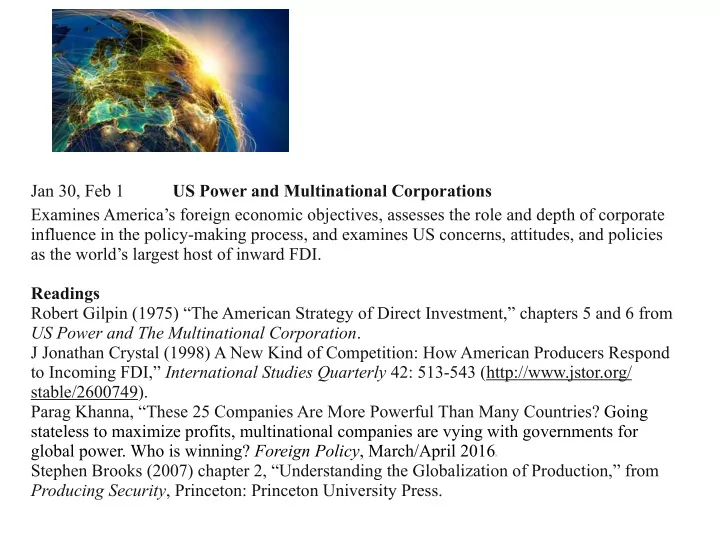

Jan 30, Feb 1 US Power and Multinational Corporations � Examines America’s foreign economic objectives, assesses the role and depth of corporate influence in the policy-making process, and examines US concerns, attitudes, and policies as the world’s largest host of inward FDI. Readings Robert Gilpin (1975) “The American Strategy of Direct Investment,” chapters 5 and 6 from US Power and The Multinational Corporation . J Jonathan Crystal (1998) A New Kind of Competition: How American Producers Respond to Incoming FDI,” International Studies Quarterly 42: 513-543 (http://www.jstor.org/ stable/2600749). Parag Khanna, “These 25 Companies Are More Powerful Than Many Countries? Going stateless to maximize profits, multinational companies are vying with governments for global power. Who is winning? Foreign Policy , March/April 2016 ) Stephen Brooks (2007) chapter 2, “Understanding the Globalization of Production,” from Producing Security , Princeton: Princeton University Press.
Objectives ❖ examine the role and depth of corporate influence in American foreign economic policy � ❖ explore the distinction between national and corporate interest � ❖ outline the different possible sources and settings for American foreign economic policy � ❖ assess the role of ideologies in preferring one view of policy formation over others
Gilpin’s title: US Power and the Multinational Corporation —some clarity ❖ an interest in how American based MNCs advance US power � ❖ but Gilpin also raises concern that US MNCs could export jobs and hollow out industry � ❖ their domestic and international operations may need to be rebalanced through changes in U.S. tax, trade and investment policy
This view in extreme form ❖ for nearly 30 years Lou Dobbs attacked MNCs for “outsourcing” American jobs (especially to China) � ❖ best known for his views on illegal immigration and border security � ❖ popular with political right but an increasingly marginal figure � ❖ dismissed by many as a “blue collar blow hard”
The mainstream economic view ❖ US MNCs enhance the nation’s economy by capital investment, R & D, and well-paying American jobs � ❖ their benefit to US enhanced, not reduced, by global engagement � ❖ foreign-affiliate activity tends to complement, not substitute for, parent activities in the US � ❖ global engagement of US MNCs supports American jobs and economic growth
Baseball, hot dogs, apple pie, and Chevrolet The MNC as “an institutional expression of the American way of life” David Korten � � 1950s, GM President Charles Wilson: “What was good for our country was good for General Motors, and vice versa” https://www.youtube.com/watch?v=yYXfdnhh2Mo
This view under attack MNCs out of control (Carl Gerstacker’s dream come true?) � � “I have long dreamed of buying an island….” in Gilpin, p. 136 � � but today, “the severing of state lifelines has become business as usual” Khanna, Foreign Policy (rise of “metanationals”) � � “Corporate deserters” (Obama) or instruments of American foreign policy? �
An increasingly pervasive image…
Bechtel Corp: example of how links between big business and government work? Evidence that corporations control America, and dictate not only its foreign policy but also its domestic one? George Schultz: July 16, 1982 – January 20, 1989 Secretary of State President of Bechtel Caspar Weinberger: January 21, 1981 – November 23, 1987 Secretary of Defence VP of Bechtel
Is it even possible to distinguish between a national and corporate (multinational) interest? ❖ not for some critics � ❖ this distinction collapses “when corporations rule the world” � ❖ “the US… we now see as almost synonymous with the transnational corporation” David Korten � ❖ this is the spirit of the “Occupy Wall Street” movement: perception of undue corporate influence on government � ❖ Santa Clara County vs. Southern Pacific Railroad 1886 an alleged watershed (US Supreme Court ruling that a corporation is a legal person)
Bringing the state back in (again…) ❖ the enhanced and impressive power of MNCs cannot be disputed � ❖ but this power has been exaggerated in the past (especially 1970s) � ❖ is it exaggerated now?
When America rules the world through its corporations ❖ Gilpin: “The government of the United States and its foreign policy are not the instruments of these powerful corporations: rather, political and corporate leaders in the United States tend to share overlapping interests and perspectives” � ❖ state remains autonomous: national security and prosperity can be reconciled by political leadership
❖ In certain cases the power of the corporations to influence decisions in a direction which favors their interest has prevailed…. But in general the role of the MNC has been viewed by political leaders in the mercantilist terms of maintaining America's share of world markets, of securing a strong position in foreign economies, and of controlling access to raw materials. Even more important, the MNC is judged to be a major generator of the foreign earnings required to ensure national prosperity and to finance military and political commitments overseas (Gilpin, “The Political Economy of the Multinational Corporation ,” The American Political Science Review , (Mar., 1976), p. 189)
Visualizing Gilpin national interest corporate interest In general…corporate interest and the “national interest,” as the latter has been defined by succeeding American administrations, have coincided. Corporate and political elites have shared the American vision of a liberal world economic order (Gilpin p. 142)
Recommend
More recommend